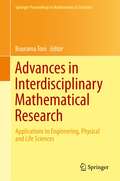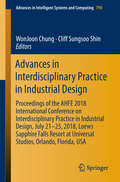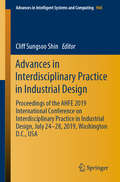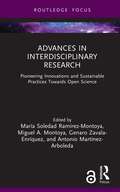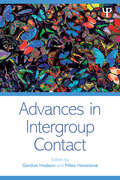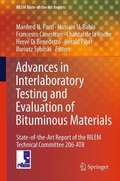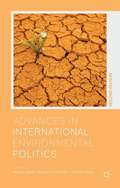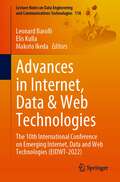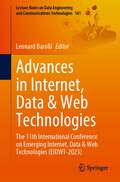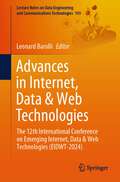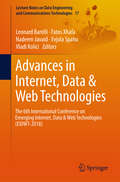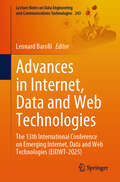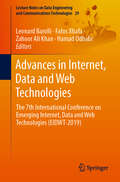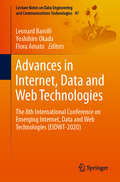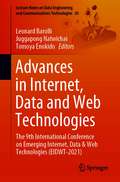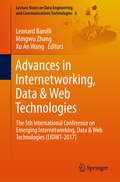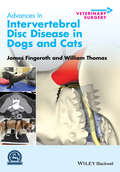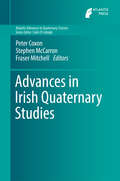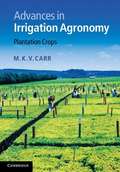- Table View
- List View
Advances in Interdisciplinary Engineering: Select Proceedings of FLAME 2020 (Lecture Notes in Mechanical Engineering)
by Niraj Kumar Rahul Sindhwani Szalay Tibor Jaesun Lee Priyank SrivastavaThis book comprises the select proceedings of the International Conference on Future Learning Aspects of Mechanical Engineering (FLAME) 2020. This volume focuses on several emerging interdisciplinary areas involving mechanical engineering. Some of the topics covered include automobile engineering, mechatronics, applied mechanics, structural mechanics, hydraulic mechanics, human vibration, biomechanics, biomedical Instrumentation, ergonomics, biodynamic modeling, nuclear engineering, and agriculture engineering. The contents of this book will be useful for students, researchers as well as professionals interested in interdisciplinary topics of mechanical engineering.
Advances in Interdisciplinary Mathematical Research: Applications to Engineering, Physical and Life Sciences (Springer Proceedings in Mathematics & Statistics #37)
by Bourama ToniThis volume contains the invited contributions to the Spring 2012 seminar series at Virginia State University on Mathematical Sciences and Applications. It is a thematic continuation of work presented in Volume 24 of the Springer Proceedings in Mathematics & Statistics series. Contributors present their own work as leading researchers to advance their specific fields and induce a genuine interdisciplinary interaction. Thus all articles therein are selective, self-contained, and are pedagogically exposed to foster student interest in science, technology, engineering and mathematics, stimulate graduate and undergraduate research, as well as collaboration between researchers from different areas. The volume features new advances in mathematical research and its applications: anti-periodicity; almost stochastic difference equations; absolute and conditional stability in delayed equations; gamma-convergence and applications to block copolymer morphology; the dynamics of collision and near-collision in celestial mechanics; almost and pseudo-almost limit cycles; rainbows in spheres and connections to ray, wave and potential scattering theory; null-controllability of the heat equation with constraints; optimal control for systems subjected to null-controllability; the Galerkin method for heat transfer in closed channels; wavelet transforms for real-time noise cancellation; signal, image processing and machine learning in medicine and biology; methodology for research on durability, reliability, damage tolerance of aerospace materials and structures at NASA Langley Research Center. The volume is suitable and valuable for mathematicians, scientists and research students in a variety of interdisciplinary fields, namely physical and life sciences, engineering and technology including structures and materials sciences, computer science for signal, image processing and machine learning in medicine.
Advances in Interdisciplinary Practice in Industrial Design: Proceedings of the AHFE 2018 International Conference on Interdisciplinary Practice in Industrial Design, July 21-25, 2018, Loews Sapphire Falls Resort at Universal Studios, Orlando, Florida, USA (Advances in Intelligent Systems and Computing #790)
by Cliff Sungsoo Shin WonJoon ChungThis book provides readers with a snapshot of cutting-edge methods and procedures in industrial design, with a particular focus on human-centered and user-experience design, service design, sustainable design and applications of virtual & augmented reality. Reporting on both theoretical and practical investigations aimed at improving industrial design through interdisciplinary collaboration, it covers a wide range of topics – from design strategies to product research and planning, exhibit design, as well as new materials and color research. Based on the AHFE 2018 International Conference on Interdisciplinary Practice in Industrial Design, held on July 21–25, 2018, in Orlando, Florida, USA, the book offers a timely guide for industrial designers, production engineers and computer scientists.
Advances in Interdisciplinary Practice in Industrial Design: Proceedings of the AHFE 2019 International Conference on Interdisciplinary Practice in Industrial Design, July 24-28, 2019, Washington D.C., USA (Advances in Intelligent Systems and Computing #968)
by Cliff Sungsoo ShinThis book provides readers with a snapshot of cutting-edge methods and procedures in industrial design, with a particular focus on human-centered and user-experience design, service design, sustainable design and applications of virtual & augmented reality. Reporting on both theoretical and practical investigations aimed at improving industrial design through interdisciplinary collaboration, it covers a wide range of topics – from design strategies to product research and planning, exhibit design, as well as new materials and color research. Based on the AHFE 2019 International Conference on Interdisciplinary Practice in Industrial Design, held on July 24–28, 2019, Washington D.C., USA, the book offers a timely guide for industrial designers, production engineers and computer scientists.
Advances in Interdisciplinary Research in Engineering and Business Management (Asset Analytics)
by P. K. Kapur Gurinder Singh Saurabh PanwarThe volume contains latest research on software reliability assessment, testing, quality management, inventory management, mathematical modeling, analysis using soft computing techniques and management analytics. It links researcher and practitioner perspectives from different branches of engineering and management, and from around the world for a bird's eye view on the topics. The interdisciplinarity of engineering and management research is widely recognized and considered to be the most appropriate and significant in the fast changing dynamics of today's times. With insights from the volume, companies looking to drive decision making are provided actionable insight on each level and for every role using key indicators, to generate mobile-enabled scorecards, time-series based analysis using charts, and dashboards. At the same time, the book provides scholars with a platform to derive maximum utility in the area by subscribing to the idea of managing business through performance and business analytics.
Advances in Interdisciplinary Research: Pioneering Innovations and Sustainable Practices Towards Open Science (Routledge Research in Higher Education)
by Miguel A. Montoya Ramírez-Montoya, María Soledad Genaro Zavala-Enríquez Antonio Martínez-ArboledaThis book explores methodologies and strategies for enhancing educational practices through interdisciplinary research and open science. Featuring global contributions, it shows how integrating diverse disciplines can drive innovation, improve teaching, and tackle modern educational challenges.The book begins by highlighting the value of interdisciplinary research, technological advancements, and innovative processes for enriching education. It includes theoretical frameworks for frontier research, practical data visualization strategies, and inclusive approaches to diversity in higher education. Readers will find discussions on knowledge transfer for social impact and guidelines for integrating equity, diversity, and inclusion in open education. It also emphasizes academic networking and personal branding, offering insights into fostering collaboration and professional development. This resource highlights both the theoretical and practical benefits of interdisciplinary research and open science.Valuable for researchers, students, and decision‑makers interested in advancing educational research, promoting inclusive practices, and emerging educational technology, this book contributes to the discourse on educational innovation and provides essential tools and concepts for advancing educational research and practice.
Advances in Intergroup Contact
by Miles Hewstone Gordon HodsonIntergroup contact remains one of the most effective means to reduce prejudice and conflict between groups. The past decade has witnessed a dramatic resurgence of interest in this time-tested phenomenon, with researchers now focusing on understanding when, why, and for whom contact does (and does not) work. This new volume focuses on one of the hottest topics in the social sciences: prejudice. Covering not only basic principles but cutting-edge findings and theoretical directions, key questions surrounding this subject are addressed, such as: how perceptions of other groups lead to anxiety and avoidance; how cross-group contact influences the development of prejudice in children; whether highly-prejudiced people benefit from contact; how status and power influence the effectiveness of contact. In addition to exploring methodological challenges facing contact researchers, attention is devoted to prejudice interventions that are rooted in our understanding of contact effects. These range from zero-acquaintance contact to intimate cross-group friendships, and even involve simulated contact experiences. This volume draws together world-renowned experts in prejudice and intergroup contact to provide a long-awaited update on the state of affairs in intergroup contact research. As well as synthesizing and integrating the key topics, it also provides possible new directions for future research. Given the prominence of contact as a powerful prejudice-reduction tool, this book is a must-read for students and scholars of social psychology and sociology, as well as policy-makers and practitioners.
Advances in Interlaboratory Testing and Evaluation of Bituminous Materials: State-of-the-Art Report of the RILEM Technical Committee 206-ATB (RILEM State-of-the-Art Reports #9)
by Chantal de la Roche Dariusz Sybilski Francesco Canestrari Herald Piber Hervé Di Benedetto Hussain U. Bahia Manfred N. PartlThis STAR on asphalt materials presents the achievements of RILEM TC 206 ATB, acquired over many years of interlaboratory tests and international knowledge exchange. It covers experimental aspects of bituminous binder fatigue testing; the background on compaction methods and imaging techniques for characterizing asphalt mixtures including validation of a new imaging software; it focuses on experimental questions and analysis tools regarding mechanical wheel tracking tests, comparing results from different labs and using finite element techniques. Furthermore, long-term rutting prediction and evaluation for an Austrian road are discussed, followed by an extensive analysis and test program on interlayer bond testing of three different test sections which were specifically constructed for this purpose. Finally, the key issue of manufacturing reclaimed hot mix asphalt in the laboratory is studied and recommendations for laboratory ageing of bituminous mixtures are given.
Advances in Internal Combustion Engine Research (Energy, Environment, and Sustainability)
by Amitava Datta Avinash Kumar Agarwal Rakesh Kumar Maurya Dhananjay Kumar SrivastavaThis book discusses all aspects of advanced engine technologies, and describes the role of alternative fuels and solution-based modeling studies in meeting the increasingly higher standards of the automotive industry. By promoting research into more efficient and environment-friendly combustion technologies, it helps enable researchers to develop higher-power engines with lower fuel consumption, emissions, and noise levels. Over the course of 12 chapters, it covers research in areas such as homogeneous charge compression ignition (HCCI) combustion and control strategies, the use of alternative fuels and additives in combination with new combustion technology and novel approaches to recover the pumping loss in the spark ignition engine. The book will serve as a valuable resource for academic researchers and professional automotive engineers alike.
Advances in International Environmental Politics
by Kathryn Hochstetler Michele M. Betsill Dimitris StevisThis book introduces readers to the field of international environmental politics (IEP) through authoritative and up-to-date surveys of its major approaches and debates. The book is divided into three parts. The chapters in Part I provide comprehensive and pluralistic reviews stressing the diversity of the field's origins, theories, and methods. The remaining chapters are organized around key research areas and allow readers to become broadly familiar with the theoretical and substantive debates that characterizethe field. In Part II, the authors review the theoretical and empirical trajectories of a given research area international political economy, gender, knowledge, governance, transnational actors, and security and present a short original case study to illuminatethe main debates that emerge. Part III reflects on four distinct frameworks for evaluating IEP: effectiveness, transparency, sustainability, and justice. Collectively, the authors demonstrate how the field of IEP has evolved and identify key questions, topics, and approaches to guide future research. "
Advances in Internet, Data & Web Technologies: The 10th International Conference on Emerging Internet, Data and Web Technologies (EIDWT-2022) (Lecture Notes on Data Engineering and Communications Technologies #118)
by Leonard Barolli Makoto Ikeda Elis KullaThis book presents original contributions to the theories and practices of emerging Internet, data, and Web technologies and their applicability in businesses, engineering, and academia. Internet has become the most proliferative platform for emerging large-scale computing paradigms. Among these, data and Web technologies are two most prominent paradigms, in a variety of forms such as Data Centers, Cloud Computing, Mobile Cloud, Mobile Web Services, and so on. These technologies altogether create a digital ecosystem whose corner stone is the data cycle, from capturing to processing, analysis, and visualization. The investigation of various research and development issues in this digital ecosystem is boosted by the ever-increasing needs of real-life applications, which are based on storing and processing large amounts of data.As a key feature, it addresses advances in the life cycle exploitation of data generated from the digital ecosystem data technologies that create value for the knowledge and businesses toward a collective intelligence approach. Researchers, software developers, practitioners, and students interested in the field of data and Web technologies find this book useful and a reference for their activity.
Advances in Internet, Data & Web Technologies: The 11th International Conference on Emerging Internet, Data & Web Technologies (EIDWT-2023) (Lecture Notes on Data Engineering and Communications Technologies #161)
by Leonard BarolliThis book presents original contributions to the theories and practices of emerging Internet, data, and web technologies and their applicability in businesses, engineering, and academia. Internet has become the most proliferative platform for emerging large-scale computing paradigms. Among these, data and web technologies are two most prominent paradigms, in a variety of forms such as data centers, cloud computing, mobile cloud, mobile web services, and so on. These technologies altogether create a digital ecosystem whose corner stone is the data cycle, from capturing to processing, analysis, and visualization. The investigation of various research and development issues in this digital ecosystem is boosted by the ever-increasing needs of real-life applications, which are based on storing and processing large amounts of data.As a key feature, it addresses advances in the life-cycle exploitation of data generated from the digital ecosystem data technologies that create value for the knowledge and businesses toward a collective intelligence approach. Researchers, software developers, practitioners, and students interested in the field of data and web technologies find this book useful and a reference for their activity.
Advances in Internet, Data & Web Technologies: The 12th International Conference on Emerging Internet, Data & Web Technologies (EIDWT-2024) (Lecture Notes on Data Engineering and Communications Technologies #193)
by Leonard BarolliThe book presents original contributions to the theories and practices of emerging internet, data, and web technologies and their applicability in businesses, engineering, and academia. As a key feature, it addresses advances in the life-cycle exploitation of data generated from the digital ecosystem data technologies that create value for the knowledge and businesses toward a collective intelligence approach.Internet has become the most proliferative platform for emerging large-scale computing paradigms. Among these, data and web technologies are two most prominent paradigms, in a variety of forms such as data centers, cloud computing, mobile cloud, and mobile web services. These technologies altogether create a digital ecosystem whose corner stone is the data cycle, from capturing to processing, analysis, and visualization. The investigation of various research and development issues in this digital ecosystem is boosted by the ever-increasing needs of real-life applications, which are based on storing and processing large amounts of data. Researchers, software developers, practitioners, and students interested in the field of data and web technologies will find this book useful and a reference for their activity.
Advances in Internet, Data & Web Technologies: The 6th International Conference On Emerging Internet, Data And Web Technologies (eidwt-2018) (Lecture Notes On Data Engineering And Communications Technologies #17)
by Fatos Xhafa Leonard Barolli Nadeem Javaid Evjola Spaho Vladi Kolici<P>This book presents original contributions on the theories and practices of emerging Internet, data and Web technologies and their applicability in businesses, engineering and academia, focusing on advances in the life-cycle exploitation of data generated from the digital ecosystem data technologies that create value, e.g. for businesses, toward a collective intelligence approach. <P> The Internet has become the most proliferative platform for emerging large-scale computing paradigms. Among these, data and web technologies are two of the most prominent paradigms and are found in a variety of forms, such as data centers, cloud computing, mobile cloud, and mobile Web services. These technologies together create a digital ecosystem whose cornerstone is the data cycle, from capturing to processing, analyzing and visualizing. The investigation of various research and development issues in this digital ecosystem are made more pressing by the ever-increasing requirements of real-world applications that are based on storing and processing large amounts of data. <P> The book is a valuable resource for researchers, software developers, practitioners and students interested in the field of data and web technologies.
Advances in Internet, Data and Web Technologies: The 13th International Conference on Emerging Internet, Data and Web Technologies (EIDWT-2025) (Lecture Notes on Data Engineering and Communications Technologies #243)
by Leonard BarolliInternet has become the most proliferative platform for emerging large-scale computing paradigms. Among these, data and web technologies are two most prominent paradigms, in a variety of forms such as Data Centers, Cloud Computing, Mobile Cloud, Mobile Web Services, and so on. These technologies altogether create a digital ecosystem whose corner stone is the data cycle, from capturing to processing, analysis and visualization. The investigation of various research and development issues in this digital ecosystem is boosted by the ever-increasing needs of real life applications, which are based on storing and processing large amounts of data. The volume “Advances in Internet, Data & Web Technologies” presents original contributions to the theories and practices of emerging Internet, Data and Web technologies and their applicability in businesses, engineering and academia. As a key feature, it addresses advances in the life-cycle exploitation of data generated from the digital ecosystem data technologies that create value for the knowledge and businesses towards a collective intelligence approach. Researchers, software developers, practitioners and students interested in the field of data and web technologies will find this book useful and a reference for their activity.
Advances in Internet, Data and Web Technologies: The 7th International Conference on Emerging Internet, Data and Web Technologies (EIDWT-2019) (Lecture Notes on Data Engineering and Communications Technologies #29)
by Fatos Xhafa Leonard Barolli Zahoor Ali Khan Hamad OdhabiThis book presents original contributions on the theories and practices of emerging Internet, Data and Web technologies and their applications in businesses, engineering and academia. As a key feature, it addresses advances in the life-cycle exploitation of data generated by digital ecosystem technologies. The Internet has become the most proliferative platform for emerging large-scale computing paradigms. Among these, Data and Web technologies are two of the most prominent paradigms, manifesting in a variety of forms such as Data Centers, Cloud Computing, Mobile Cloud, Mobile Web Services, and so on. These technologies altogether create a digital ecosystem whose cornerstone is the data cycle, from capturing to processing, analysis and visualization. The need to investigate various research and development issues in this digital ecosystem has been made even more pressing by the ever-increasing demands of real-life applications, which are based on storing and processing large amounts of data. Given its scope, the book offers a valuable asset for all researchers, software developers, practitioners and students interested in the field of Data and Web technologies.
Advances in Internet, Data and Web Technologies: The 8th International Conference on Emerging Internet, Data and Web Technologies (EIDWT-2020) (Lecture Notes on Data Engineering and Communications Technologies #47)
by Leonard Barolli Flora Amato Yoshihiro OkadaThis book presents original contributions on the theories and practices of emerging Internet, data and web technologies and their applicability in businesses, engineering and academia. The Internet has become the most proliferative platform for emerging large-scale computing paradigms. Among them, data and web technologies are two most prominent paradigms, and manifest in a variety of forms such as data centers, cloud computing, mobile cloud, mobile web services and so on. Together, these technologies form a digital ecosystem based on the data cycle, from capturing to processing, analysis and visualization. The investigation of various research and development issues in this digital ecosystem is made all the more important by the ever-increasing needs of real-life applications, which involve storing and processing large amounts of data. As a key feature, the book addresses advances in the life-cycle exploitation of data generated from the digital ecosystem, and data technologies that create value for businesses, moving toward a collective intelligence approach. Given its scope, the book offers a valuable reference guide for researchers, software developers, practitioners and students interested in the field of data and web technologies.
Advances in Internet, Data and Web Technologies: The 9th International Conference on Emerging Internet, Data & Web Technologies (EIDWT-2021) (Lecture Notes on Data Engineering and Communications Technologies #65)
by Leonard Barolli Tomoya Enokido Juggapong NatwichaiThis book presents original contributions to the theories and practices of emerging Internet, data and web technologies and their applicability in businesses, engineering and academia. The Internet has become the most proliferative platform for emerging large-scale computing paradigms. Among these, data and web technologies are two most prominent paradigms, in a variety of forms such as data centers, cloud computing, mobile cloud, mobile web services and so on. These technologies altogether create a digital ecosystem whose cornerstone is the data cycle, from capturing to processing, analysis and visualization. The investigation of various research and development issues in this digital ecosystem is boosted by the ever-increasing needs of real-life applications, which are based on storing and processing large amounts of data. As a key feature, this book addresses advances in the life cycle exploitation of data generated from the digital ecosystem data technologies that create value for the knowledge and businesses toward a collective intelligence approach. Researchers, software developers, practitioners and students interested in the field of data and web technologies will find this book useful and a reference for their activity.
Advances in Internetworking, Data & Web Technologies: The 5th International Conference on Emerging Internetworking, Data & Web Technologies (EIDWT-2017) (Lecture Notes on Data Engineering and Communications Technologies #6)
by Leonard Barolli Mingwu Zhang Xu An WangThis book highlights the latest research findings, innovative research results, methods and development techniques, from both theoretical and practical perspectives, in the emerging areas of information networking, data and Web technologies. It gathers papers originally presented at the 5th International Conference on Emerging Internetworking, Data & Web Technologies (EIDWT-2017) held 10-11 June 2017 in Wuhan, China. The conference is dedicated to the dissemination of original contributions that are related to the theories, practices and concepts of emerging internetworking and data technologies - and most importantly, to how they can be applied in business and academia to achieve a collective intelligence approach. Information networking, data and Web technologies are currently undergoing a rapid evolution. As a result, they are now expected to manage increasing usage demand, provide support for a significant number of services, consistently deliver Quality of Service (QoS), and optimize network resources. Highlighting these aspects, the book discusses methods and practices that combine various internetworking and emerging data technologies to capture, integrate, analyze, mine, annotate, and visualize data, and make it available for various users and applications.
Advances in Intervertebral Disc Disease in Dogs and Cats
by James Fingeroth William ThomasAdvances in Intervertebral Disc Disease in Dogs and Cats defines our present knowledge of this common clinical problem, compiling information related to the canine and feline intervertebral disc into a single resource. As a comprehensive, focused work, the book is an authoritative reference for understanding and treating disc disease, providing a sound scientific and clinical basis for decision making. Offering an objective synthesis of the current literature, the book supplies guidance on the approach to a potential disc rupture, surgical and medical strategies, and management of the patient.Offering a complete understanding of intervertebral disc disease, the book describes and discusses the controversies and issues surrounding this topic, acknowledging the gaps in our knowledge. Advances in Intervertebral Disc Disease in Dogs and Cats presents up-to-date, reliable information on this common condition for veterinary surgeons, neurologists, and general practitioners.
Advances in Intravital Microscopy: From Basic to Clinical Research
by Roberto WeigertThis is the first book entirely dedicated to Intravital Microscopy. It provides the reader with a broad overview of the main applications of Intravital Microscopy in various areas of the biomedical field. The book contains accurate descriptions of the state of the art methodologies used to image various organs at different level of resolution, ranging from whole tissue down to sub-cellular structures. Moreover, it is an extremely valuable guide to scientists that want to adopt this powerful technique and do not have experience with animal models and microscopy.
Advances in IoT and Security with Computational Intelligence: Proceedings of ICAISA 2023, Volume 1 (Lecture Notes in Networks and Systems #755)
by Anurag Mishra Deepak Gupta Girija ChettyThe book is a collection of peer-reviewed best-selected research papers presented at the International Conference on Advances in IoT and Security with AI (ICAISA 2023), organized by Deen Dayal Upadhyaya College, University of Delhi, New Delhi, India, in collaboration with University of Canberra, Canberra, Australia, and NIT, Arunachal Pradesh, Itanagar, AP, India, during March 24–25, 2023. The book includes various applications and technologies in this specialized sector of Industry 4.0. The book is divided into two volumes. It focuses on recent advances in Internet of Things and security with its applications using artificial intelligence.
Advances in IoT and Security with Computational Intelligence: Proceedings of ICAISA 2023, Volume 2 (Lecture Notes in Networks and Systems #756)
by Anurag Mishra Deepak Gupta Girija ChettyThe book is a collection of peer-reviewed best-selected research papers presented at the International Conference on Advances in IoT and Security with AI (ICAISA 2023), organized by Deen Dayal Upadhyaya College, University of Delhi, New Delhi, India, in collaboration with University of Canberra, Canberra, Australia, and NIT, Arunachal Pradesh, Itanagar, AP, India, during March 24–25, 2023. The book includes various applications and technologies in this specialized sector of Industry 4.0. The book is divided into two volumes. It focuses on recent advances in Internet of Things and security with its applications using artificial intelligence.
Advances in Irish Quaternary Studies (Atlantis Advances in Quaternary Science #1)
by Peter Coxon Stephen Mccarron Fraser MitchellThis book provides a new synthesis of the published research on the Quaternary of Ireland. It reviews a number of significant advances in the last three decades on the understanding of the pattern and chronology of the Irish Quaternary glacial, interglacial, floristic and occupation records. Those utilising the latest technology have enabled significant advances in geochronology using accelerated mass spectrometry, cosmogenic nuclide extraction and optically stimulated luminescence amongst others. This has been commensurate with high-resolution geomorphological mapping of the Irish land surface and continental shelf using a wide range of remote sensing techniques including MBES and LIDAR. Thus the time is ideal for a state of the art publication, which provides a series of authoritative reviews of the Irish Quaternary incorporating these most recent advances.
Advances in Irrigation Agronomy
by Jerry Knox M. K. Carr Rob LockwoodIrrigation has been used for thousands of years to maximize the performance, efficiency and profitability of crops and it is a science that is constantly evolving. This potential for improved crop yields has never been more important as population levels and demand for food continue to grow. Recognising the need for a coherent and accessible review of international irrigation research, this book examines the factors influencing water productivity in individual crops. It focuses on nine key plantation/industrial crops on which millions of people in the tropics and subtropics depend for their livelihoods (banana, cocoa, coconut, coffee, oil palm, rubber, sisal, sugar cane and tea). Linking crop physiology, agronomy and irrigation practices, this is a valuable resource for planners, irrigation engineers, agronomists and producers concerned with the international need to improve water productivity in agriculture in the face of increased pressure on water resources.

